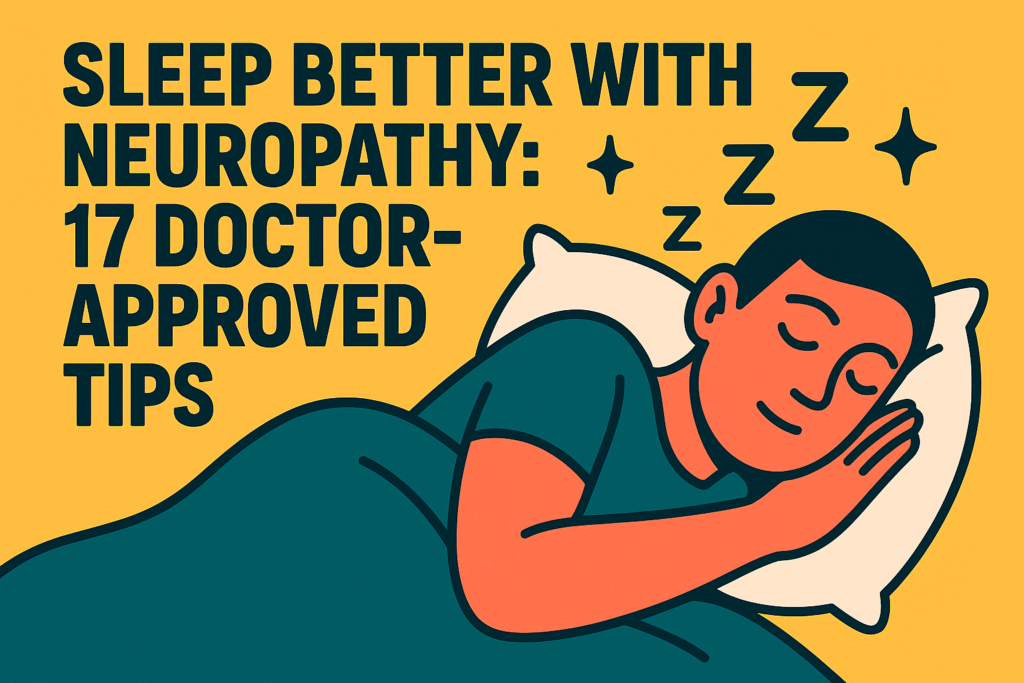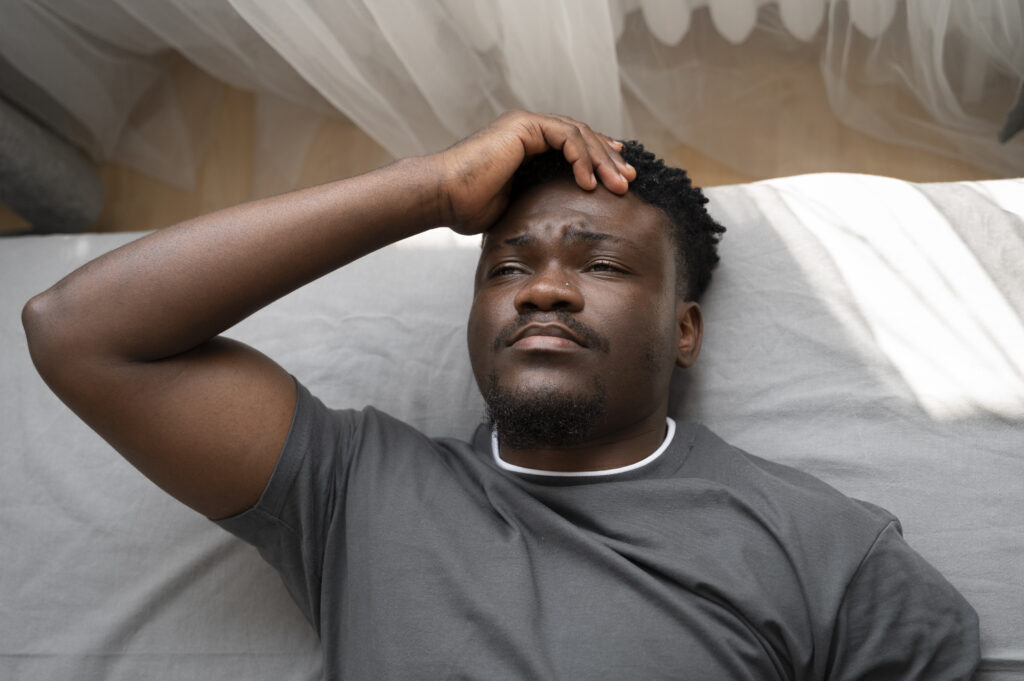
⚠️ Affiliate Disclaimer: This post may contain affiliate links, which means I may earn a small commission — at no extra cost to you — if you make a purchase through one of these links. I only recommend products or services I genuinely trust and believe can provide value. Thank you for supporting My Medical Muse!
Sleep Better with Neuropathy: 14 Doctor-Approved Tips
If you live with peripheral neuropathy, you probably know the struggle of trying to fall asleep while your feet feel like they’re buzzing, burning, or crawling with invisible insects. Nighttime can turn into a tormenting battlefield between your exhausted body and nerve pain that just won’t quit. You’re not alone, an estimated 60-70% of people with diabetes (a leading cause of neuropathy) report sleep disturbances, and neuropathic pain is often worst at night. Whether your discomfort stems from diabetes, chemotherapy, injury, or another cause, one thing is clear: poor sleep only worsens your pain, mood, and overall health.
But here’s the good news, you can sleep better even with neuropathy with the right mix of lifestyle changes, nighttime routines, and evidence-backed remedies, you can calm your nerves and finally get the rest your body deserves.
Let’s explore 14 practical, science-backed tips to help you sleep better when neuropathy affects your feet.
Table of Contents:
Why Neuropathy Feels Worse at Night
It’s not your imagination neuropathy symptoms really do worsen at night. Here’s why:
- Fewer distractions: During the day, your brain is busy with activity, at night, you’re more aware of every tingle or ache.
- Body position: Lying down can change blood flow and compress nerves, especially if you have poor circulation.
- Temperature changes: Nerves are sensitive to temperature, cool environments can trigger pain or increase awareness of tingling.
- Circadian Rhythms: Your body’s natural pain-suppressing hormones (like cortisol) dip at night, which may intensify pain signals.
The result? Sleep becomes elusive, and pain becomes more pronounced, creating a vicious cycle.
Also Read: Diabetic Neuropathy
How Poor Sleep Worsens Neuropathy
Lack of sleep doesn’t just make you groggy, it can amplify nerve pain and make your condition worse over time.
- Sleep deprivation lowers your pain threshold, making symptoms feel more intense.
- It triggers inflammation and worsens blood sugar control, especially in diabetics.
- Fatigue reduces your ability to cope with chronic pain mentally and emotionally.
That’s why improving your sleep quality isn’t just about comfort, it’s a vital part of neuropathy management.
14 Proven Ways to Sleep Better with Neuropathy Foot Pain
Let’s walk through some real-world solutions. You don’t need to do everything at once, even 2-3 of these changes can make a big difference.
Elevate Your Legs Before Bed
Poor circulation can make neuropathy symptoms worse. Prop your legs up on a few pillows for 10-15 minutes before sleep, or use a leg elevation wedge pillow to sleep with your feet slightly raised.
This promotes blood flow and reduces swelling, helping your nerves settle down.
Apply Warmth or Cold, if That Works for You.
Some people find that warmth soothes their nerves, while others prefer cold. Try both and see which works for your body. A warm foot soak (with Epsom salts or chamomile) before bed may ease pain and help you relax.
A cold compress wrapped in a towel can dull sharp, burning sensations.
Note: Always check water temperature carefully if you have numbness, you don’t want burns or frostbite.
Try Magnesium Lotion or Oil on Your Feet
Magnesium plays a role in nerve health and muscle relaxation. Rubbing magnesium chloride oil or lotion into your feet before bed may reduce pain and cramping, promote calmness and deeper sleep.
Look for topical magnesium products labeled “for sleep” or “for nerve pain.”
Use a Weighted Blanket
A light-to-medium weighted blanket (5-15 lbs) can reduce anxiety and calm your nervous system through deep pressure stimulation. This tactile input may help distract your brain from foot tingling and ease your path into sleep.
Switch to Bamboo or Soft Moisture-Wicking Socks
Soft, breathable socks can provide gentle pressure without irritating your skin. Some people even report less tingling when they wear bamboo or diabetic socks to bed. More comfort from seamless, padded socks that prevent rubbing.
Use Over-the-Counter Topicals or Nerve Creams
Look for pain-relief creams with ingredients like:
- Capsaicin (from chili peppers): temporarily numbs nerve endings.
- Lidocaine: local anesthetic
- Menthol or camphor: creates a cooling sensation to override pain.
Apply only a thin layer, and always wash your hands after.
Take a Bedtime Nerve Support Supplement
Some ingredients shown to support nerve health and ease pain include:
- Alpha-lipoic acid (ALA)
- Benfotiamine (a form of B1)
- Vitamin B12 (methylcobalamin)
- Magnesium glycinate
- Passionflower, valerian root, or lemon balm for sleep support.
Ask your doctor before combining supplements with prescription meds.
Try Gentle Nighttime Stretches or Yoga
Loosening tight calf muscles and feet can ease nerve pressure. Consider:
- Calf stretches
- Toe curls and ankle circles
- Gentle seated yoga poses
Avoid intense activity. aim for relaxing, rhythmic movement before bed.
Soak Your Feet in Apple Cider Vinegar (ACV):
This age-old remedy may help by improving circulation and reducing inflammation.
- Mix 1 part ACV with 2 parts warm water.
- Soak for 15–20 minutes.
- Dry feet completely and moisturize afterward.
- Do this 2-3 times a week, not daily, to avoid skin irritation.
Block Out Blue Light an Hour Before Bed
Screens from phones, TVs, and tablets suppress melatonin and delay sleep making you more aware of pain. Use blue-light-blocking glasses, switch screens to night mode or better yet avoid screens 1-2 hours before bed, try reading a paper book, journaling, or listening to calm music instead.
Create a Cool, Quiet, Dark Sleep Environment
Neuropathy already makes you sensitive, so any discomfort in your room can make symptoms worse. Use blackout curtains or a sleep mask, keep your room cool (18-20°C / 65-68°F), use a fan or white noise machine.
Maintain a Regular Sleep Schedule
Your body loves rhythm, going to bed and waking up at the same time daily trains your body to expect sleep, reducing time spent tossing and turning. Even on weekends, try to wake up within an hour of your weekday routine.
Use Guided Sleep Meditations or Sound Therapy
Apps like Calm, Insight Timer, or YouTube channels offer neuropathy-specific sleep meditations that blend:
- Gentle music
- Breathing cues
- Body scanning
Some people also sleep better with binaural beats or soothing nature sounds.
Talk to Your Doctor About Prescription Options:
If your nerve pain keeps you up every night despite all efforts, you don’t have to suffer in silence.
Some medications that can help:
- Low-dose gabapentin or pregabalin for nerve pain
- Tricyclic antidepressants like amitriptyline for pain and sleep
- Sleep aids (used short-term) if insomnia persists.
Work with a neurologist or pain specialist to find the safest, most effective plan.
When to See a Doctor:
Make an appointment if:
- Your neuropathy symptoms suddenly worsen.
- You experience numbness, ulcers, or infections on your feet.
- You can’t sleep at all despite home remedies.
- Your quality of life is suffering.
Early intervention can prevent complications and help you regain control.
Takeaway: You Deserve Restful Sleep, Even with Neuropathy
Living with neuropathy doesn’t mean you have to surrender your nights to pain. From topical creams and foot soaks to guided meditations and supplements, there are so many ways to support your nerves and help your body rest. Try experimenting with a bedtime routine that soothes your senses and gives your nerves a break. Keep a journal to track what works for you and don’t hesitate to seek medical advice if needed.
Your body heals when you sleep and with a little help, better nights and brighter mornings are within reach.
👩⚕️ Need Personalized Health Advice?
Get expert guidance tailored to your unique health concerns through MuseCare Consult. Our licensed doctors are here to help you understand your symptoms, medications, and lab results—confidentially and affordably.
👉 Book a MuseCare Consult Now

